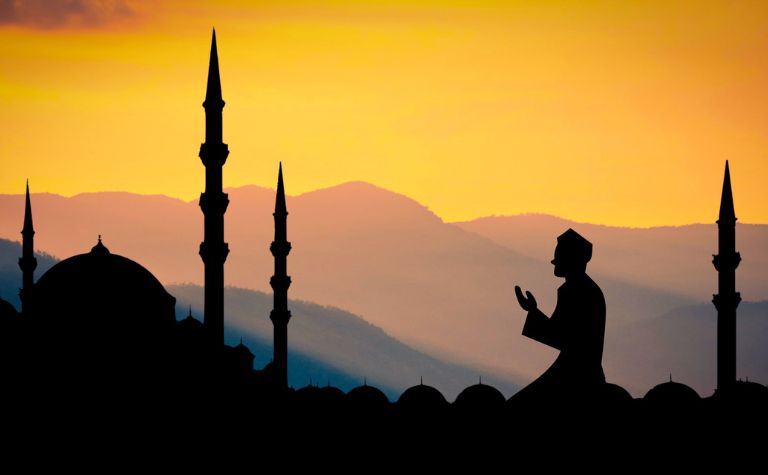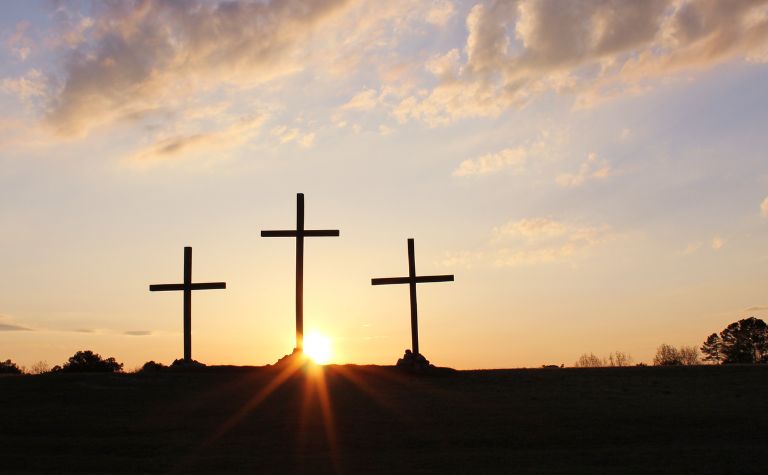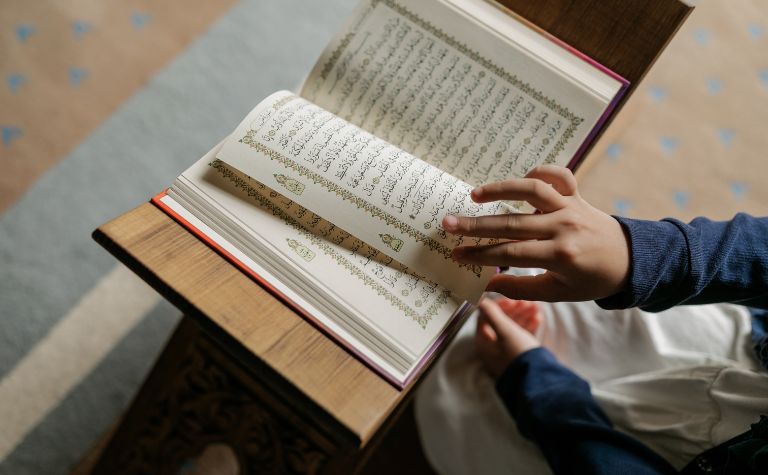Christianity and Islam are two of the world’s largest religions, each with unique beliefs, practices, and traditions. Originating in the Middle East, they share some historical roots and monotheistic principles but differ in key areas like the nature of God, sacred texts, and religious practices.
The teachings of Jesus Christ guide Christians, while Muslims follow the teachings of the Prophet Muhammad. Christians read the Bible. Muslims read the Quran. Learn more about the similarities and differences between these religions using the comparison charts below.

Comparing Christianity and Islam: At a Glance
Christianity believes in the Trinity and salvation through Jesus Christ, with the Bible as its sacred text. Islam emphasizes the oneness of God (Allah) and follows the Five Pillars, with the Quran as its scripture. Different practices and beliefs define each faith.
| Aspect | Christianity | Islam |
|---|---|---|
| Name | Christianity | Islam |
| Size | Around 2.3 billion followers | Around 1.9 billion followers |
| Date Started | 1st Century AD | 7th Century AD |
| Founder | Jesus Christ | Prophet Muhammad |
| Key Beliefs | Belief in the Trinity, salvation through faith in Jesus Christ | Belief in one God (Allah), the Five Pillars of Islam, Prophethood |
| Key Practices | Prayer, sacraments (e.g., baptism), church attendance, reading the Bible | Prayer (Salat), almsgiving (Zakat), fasting (Sawm), pilgrimage (Hajj) |
| Divisions | Catholic, Orthodox, Protestant | Sunni, Shia |
| Central Location | Vatican City (for Catholicism) | Mecca, Saudi Arabia |
| Sacred Texts | The Bible | The Quran |
The Five Pillars of Islam are the core beliefs and practices of Muslims. They include Shahada (faith declaration), Salat (daily prayers), Zakat (charity), Sawm (fasting during Ramadan), and Hajj (pilgrimage to Mecca). Together, they form the foundation of Islamic life, guiding moral conduct and spiritual devotion.
The doctrine of the Trinity in Christianity describes God as one being in three persons: the Father, the Son (Jesus Christ), and the Holy Spirit. These three persons are distinct yet coexist in unity, sharing the same essence or substance, a core belief that shapes Christian understanding of God.

Comparing the Bible and the Quran
Understanding the difference between the Bible and the Quran is essential, as they are the foundational texts of Christianity and Islam, respectively.
| Aspect | The Bible | The Quran |
|---|---|---|
| Language of Origin | Hebrew, Aramaic, Greek | Classical Arabic |
| Time of Compilation | Various books written over centuries | Compiled within 23 years of Muhammad’s death |
| Number of Books/Chapters | 66 books (Protestant); 73 (Catholic) | 114 Surahs (chapters); about 1/3 the size of the Bible |
| Authors | Multiple human authors | Believed to be the literal word of God through the Angel Gabriel to Muhammad |
| Central Themes | Creation, covenant, salvation through Jesus Christ | Oneness of God, guidance for living, judgment day |
| Primary Language(s) Today | Translated into many languages | Arabic (translations available, but Arabic considered the sacred language) |
| Interpretations | Various interpretations and translations | Interpretations may vary, but the Arabic text remains unchanged |
Christian and Islamic Beliefs: Similarities and Differences
Understanding the differences between Christian and Muslim beliefs enables individuals to grasp the complexities of two major world religions, influencing culture, politics, law, and social norms.
This awareness helps people navigate diverse social environments, make informed decisions, and engage with global issues from a more nuanced perspective.
| Aspect | Christianity | Islam |
|---|---|---|
| God | One God, Triune (Father, Son, Holy Spirit) | One God (Allah), without partners or equals |
| The Universe | Created by God, guided by divine providence | Created by Allah, operates under His will |
| Ultimate Reality | God is the ultimate reality; faith in Christ leads to truth | Allah is the ultimate reality; truth is found in submission to His will |
| Human Beings | Made in God’s image, fallen but redeemable through Christ | Created by Allah with the ability to choose good or evil; moral responsibility |
| Problem with the World | Sin, a rebellion against God’s will, leading to spiritual separation | Deviation from Allah’s path, failure to follow His guidance, leading to moral and spiritual corruption |
| Solution to the Problem | Faith in Jesus Christ, repentance, and living according to God’s commandments | Submission to Allah, following the Five Pillars, and living a moral life according to the teachings of the Quran |
| Afterlife | Heaven or Hell, based on faith in Christ and good works | Paradise or Hell, based on faith and deeds, Allah’s mercy |
Heaven in Christianity is often depicted as an eternal union with God, where believers enjoy God’s presence in the New Heavens and New Earth. Paradise in Islam is described as a lush garden with rivers of milk and honey, where believers are rewarded.

Comparing the Lives of Jesus Christ and Muhammad
Understanding the differences between Jesus and Muhammad is crucial as they are central figures in Christianity and Islam. Their teachings and examples shape the beliefs and practices of billions of followers.
| Aspect | Jesus Christ | Muhammad |
|---|---|---|
| Name | “Jesus” means “God saves”; “Christ” means “Anointed One” | “Muhammad” means “Praiseworthy” |
| Lifetime | c. 4 BC – c. AD 30/36 | c. AD 570 – 632 |
| Home | Born in Bethlehem, lived in Galilee, Judea | Born in Mecca, lived in Mecca and Medina, Saudi Arabia |
| Family | Mother: Mary; Father: Joseph (foster father) | Father: Abdullah; Mother: Amina; Wives include Khadija |
| Central Message | Love, forgiveness, repentance, salvation through faith in Him; the Kingdom of God | Oneness of God, submission to His will, moral living |
| Records | The New Testament of the Bible, primarily the Gospels | The Quran, with biographical details in Hadith and Sira |
Understanding how Jesus and Muhammad died is vital, as their deaths have profound significance in Christianity and Islam.
Jesus’ crucifixion is central to Christian beliefs about salvation, while Muhammad’s death marks the completion of the revelation of Islam.
| Aspect | Jesus Christ | Muhammad |
|---|---|---|
| Date of Death | c. AD 30/36 | June 8, 632 AD |
| Cause of Death | Crucifixion | Believed to be a fever from poisoning |
| Location of Death | Jerusalem | Medina, Saudi Arabia |
| Age at Death | Approximately 33 years old | Approximately 62 years old |
| Burial Place | Tomb near Golgotha (later resurrected according to Christian belief) | Al-Masjid an-Nabawi, Medina |
Understanding the aftermath of Jesus’ and Muhammad’s deaths is crucial for comprehending the historical and theological foundations of Christianity and Islam.
Their deaths marked significant turning points, influencing the development, spread, and shaping of these religions, which continue to impact millions of lives and the global cultural landscape.
| Aspect | Jesus Christ (Christianity) | Muhammad (Islam) |
|---|---|---|
| Immediate Aftermath | Resurrection, appearances to followers | Succession crisis, selection of the first Caliph |
| Impact on Teachings | Spread of Christianity by Apostles | Codification of Quran, expansion of Islamic rule |
| Succession of Leadership | Apostles led early Christian communities | First four Caliphs continued Muhammad’s work |
| Effect on Followers | Persecution and growth of the early church | Rapid expansion of the Muslim community, conquests |
| Long-Term Legacy | Formation of various Christian denominations | Formation of Sunni and Shia branches |

10 Important Events in Christian and Islamic History
Knowing about the major events in Christian and Islamic history is essential for understanding the cultural, political, and social development of civilizations influenced by these faiths.
It provides context to historical narratives and contemporary issues, helping in comprehending the complex interplay between religion and global affairs.
| Christianity | Islam |
|---|---|
| 1. Birth of Jesus Christ (c. 4-6 BC) | 1. Birth of Muhammad (570 AD) |
| 2. Crucifixion of Jesus (c. 30-36 AD) | 2. First revelation to Muhammad (610 AD) |
| 3. Council of Nicaea (325 AD) | 3. Hijra, migration to Medina (622 AD) |
| 4. Conversion of Emperor Constantine (312 AD) | 4. Muhammad’s Night Journey & Ascension (Isra and Mi’raj) (621 AD) |
| 5. Formation of the New Testament Canon (c. 4th century) | 5. Death of Muhammad (632 AD) |
| 6. Great Schism between East & West (1054) | 6. Umayyad Caliphate’s expansion (661-750 AD) |
| 7. Crusades (1095-1291) | 7. Golden Age of Islam (8th-13th century) |
| 8. Protestant Reformation (1517) | 8. Mongol sack of Baghdad (1258) |
| 9. Council of Trent (1545-1563) | 9. Ottoman conquest of Constantinople (1453) |
| 10. Vatican II Council (1962-1965) | 10. Foundation of the modern Saudi state (1932) |
Related Questions
Exploring the world's religions using the comparison charts below offers fascinating insights into cultures and beliefs. It opens doors to understanding human history, values, and...
Explore the rich diversity of Christian denominations. Learn how varied beliefs, practices, and traditions shape the Christian faith. Understanding these differences can deepen your insight into...
